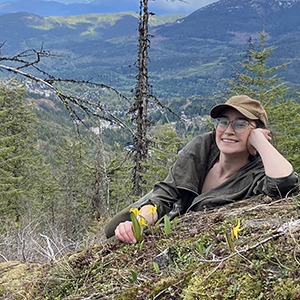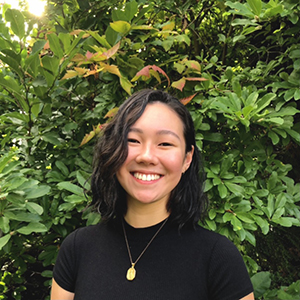A Small Window: Anne Hung in Conversation with Carlee Bouillon

Carlee Bouillon, whose story “You Should Be There (When They Go)” appears in The Malahat Review’s summer issue #215, discusses stories as memory devices, writing from the perspective of a young narrator, and how every fiction is somebody’s documentary in her Q&A with Malahat Review Creative Nonfiction Board intern Anne Hung. Read an excerpt of "You Should Be There (When They Go)" here.
Carlee Bouillon is an education assistant, research assistant, and vet assistant who writes from the unceded Coast Salish Territory of the Lekwungen and W̱SÁNEĆ nations. She is a dog person, math person, periodic cave dweller, and jack of some trades. Like everyone else, she writes about the things she loves and the things that hurt. Her work often thinks about person-nature relationships, the ethics and effects of anthropomorphism, and what to do with a faith you might have lost. She is the current editor of the Canadian Caver magazine, and her research considers the role of literature in the conservation of biodiversity and fragile ecosystems. When not writing, reading, or working, she is likely playing music or out for a roam—probably at least a little bit lost. Find her words in This Side of West, the Femme Handbook, forthcoming in Grain Magazine, and elsewhere.
Told from an eleven-year-old girl’s point of view, “You Should Be There (When They Go)” grapples with mental illness, trauma, death, and compassion. What inspired you to explore these complex topics through such a young narrator?
My original plan for this story was relatively lighthearted. I wanted to write a story about a kid with a horse, because when I was a kid, I had a horse, and it was a neat time. I loved him (good old Hudson) with my whole, tumultuous pre-teen heart, and to this day I think that has been the simplest, most unselfish transaction of love I have experienced. So, I figured writing about a horse based on Hudson (the quirky and bumbling packhorse of my childhood) would be a fun exercise—an opportunity to try writing about love. I actually thought it would be a reprieve from writing more intense adult content. In hindsight, that was pretty dumb. I’ve been eleven—I should have known that going back into the brain of an eleven-year-old would be weird and sad and confusing. When I got into this narrator’s head, it came back to me just how obliterating my feelings used to be at her age. The good, bad, ugly—it makes no difference, all of them were intense. It’s the part-blessing, part-curse that afflicts every kid: the need to feel everything to the extreme because life hasn’t taught you to put up guards yet.
I wanted “You Should Be There (When They Go)” to reveal a small window of this narrator’s life, unfiltered by adult perception. And I wanted this window to be complete—difficult elements not exempt. I never set out to write a story about trauma, death, or mental illness. Even after its development, I don’t define this story, in my head, to be “about” trauma, death, or mental illness. Those elements appeared partway through development, after my narrator came to life, and I hardly feel like I made them up—it seemed rather like they were just the things she was dealing with at the moment I decided to portray her. I don’t mean that they are in the story without intention—absolutely each element in this story has been interrogated for its purpose—I just mean that these topics are not exclusively adult problems, and it became important to me that if I am going to reveal a piece of a child’s life, I recognize that hard things are just as likely to be there as they would in an adult’s life (and appropriately acknowledge them). This is when I developed the rest of her world. I became interested in this concept of a young narrator as an ill-informed documentarian. She doesn’t quite grasp the story she’s telling, because she hasn’t been exposed to trauma and death and mental illness before. But she still has to be the one to respond to her experiences, with little background knowledge. Then it becomes up to the reader to pick up the pieces of her narrative and put them together. That was such a counterintuitive way for me to write. It’s natural to create narrators who know more than the reader, not the other way around.
In short, my intention wasn’t to write a story that explores complex topics through the perception of a child, but instead to write a story that explores a child’s perception of complex topics. I think “You Should Be There (When They Go)” became a way for me to give a small tip-of-hat to any kid in the process of learning that, although life is awesome, it also sucks a lot. And in a way—even though the final story took on its own life so far from my own experiences—it’s a small tip-of-hat to my eleven-year-old self who equated maturity with toughness, and tried to be mature.
Some of the most tender moments in “You Should Be There (When They Go)” feature the connection between the narrator, her horse Hamilton, and Larissa. These moments also demonstrate the intense emotions that can accompany caregiving—whether one is caring for a beloved person or animal. What do you hope readers take away from this connection?
I think that when someone has a problem they can’t solve, they try to solve a different one. The narrator doesn’t know how to fix Larissa and doesn’t seem to understand her mother. But her love for Hamilton has a clear reward: if she loves hard enough, Hamilton feels better. She puts her whole heart into Hamilton’s wellbeing, and to some extent, controls it. Taking care of him grounds her. I don’t really mind whether or not a reader takes away some lesson about how taking care of someone else takes care of yourself at the same time. But I do hope that they will be able to recognize the narrator’s need to make someone—anyone—better. Because I think that is the heart of the whole piece. She wants to know how to be there for her loved ones, and if she can’t be there for one, maybe it is enough that she is there for the other.
“You Should Be There (When They Go)” is a fiction piece, but, as part of your undergraduate research, you studied the intersections of poetry and non-fiction. What led you to investigate this topic? Do you think that this research had an impact on your writing?
Yes, absolutely. That research was a culmination of a lot of ideas that I have been thinking about in all of my writing, including fiction, for a long time. I initially started that research project in my undergrad because I wanted to consider at what point a piece of prose poetry was “too” true to avoid the non-fiction label (and how form plays into these definitions). Instead, I ended up interrogating myself (and others) about whether I (or anyone) have the right to write other peoples’ stories, considering especially the distortion that the author’s personal choices of framing, interpretation, formatting, etc. can cause to an original narrative. I think that this idea and my original research plan have the same root question at heart: at what point must you expose yourself as a documentarian? And: what are the ethics of documentary, when it is poetic (or, how much creative license does the mere label “poetry” allow, when writing a true story)? My research considered these rights in terms of telling the stories of lived or living people, but I think this extends almost as much to fictive characters. Because whenever I create a person on the page, I am making a claim that a living person could feel the way that my created person feels. And then I go and tell their story. I don’t think this should be taken lightly. Words have a lot of power. Stories are memory devices, and they are how we learn and what we become. Every fiction is somebody’s documentary—if not in action and setting, then in theme or topic. I believe that if a story can be told, then it has been lived, in some important way. So I think that we should always question our right to tell any story, fictive or non-fictive—and before we write a story, figure out if we can justify our need to write it at all. Obviously we’ll fail a little bit every time. That’s fine, I think. But how much intention are we putting into fiction? Because if it is less than what we are putting into non-fiction, I think that’s a problem.
Alongside trees, caves, and small planes, you cite bookstores as a place where you feel that you are your best self. If you found yourself in a tree, cave, or small plane for a prolonged period of time, what books would you want with you and why?
Maybe a bird book, or a rocks and minerals book, or a fungi book, depending on which place I was in? Or, if I had to choose a literature bible to carry everywhere and quote to people, I might choose Quarrels by Eve Joseph, because it asks big questions about life, via poetic accounts of bizarre and oddly lovely [disturbing] images—which is essentially everything I aspire to do. I’d say that generally, though, those locations are not reading places, they are living places. I like to get outside to stop thinking about life and finances and school plans and career, and think about nothing at all instead. I can’t really explain why I like doing the cave thing, beyond that I like crawling underground to look at rocks and mud and drops of water. The small planes mention is because I used to skydive, and even though that’s not an active part of my life anymore, small planes make the top three list of places I feel most content and myself. These are each recharge places. Sometimes I call those experiences “research,” because most of my fiction and poetry begins with a seed of truth from my own lived experience, and interesting experiences make for more interesting fiction. But really, places like these are where I like to go be a person, and not a scrabbling fresh college grad. So if I’m reading books there, I’ve messed something up!

Anne Hung
* * * * * * * *









